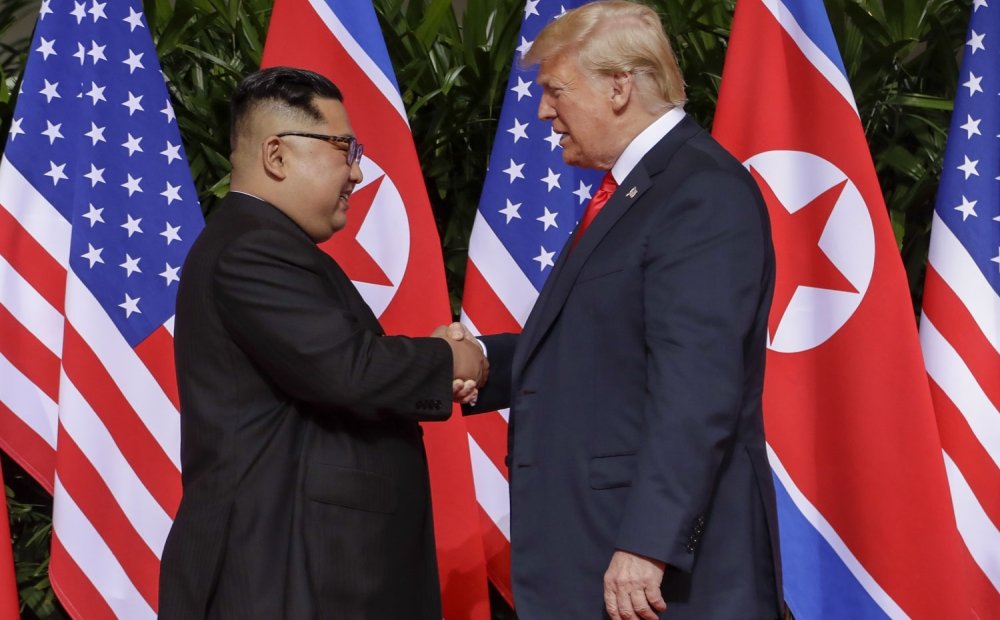Ground Truth Briefing | North Korea Summit: Historic Deal or Just a Historic Handshake?

With a handshake, U.S. President Donald Trump and North Korea’s Kim Jong Un made history, becoming the first sitting leaders of the Korean War foes to hold a summit. But was it just a photo op?
In this Ground Truth Briefing, Wilson Center experts considered whether the Singapore summit yielded real progress on denuclearization; the impact of these developments on U.S. diplomacy with other countries; China’s reaction; how the lives of average North Koreans could be affected; and what’s next in what President Trump calls “a new chapter” in U.S.-North Korea relations.
Selected Quotes
Jane Harman
“I think that there are not only opportunities ahead, but big land mines ahead. Some of the statements from President Trump in the last day were not briefed to our allies, and there is some confusion even in his own administration about what they mean. ‘Ending war games’ was a phrase used by the North Koreans until yesterday, not by us."
“Removing our military from South Korea is something that I think has now been corrected to mean in the longer term, but nonetheless, has huge implications for the nuclear umbrella we have always had in the region to protect our allies.”
Robert S. Litwak
“I think an achievement of the summit was a change to the psychology of the nuclear crisis with North Korea and [it] has really put off the prospect of a preventive U.S. military strike, which we seemed to be moving toward in 2017."
"The process that is unfolding from the Singapore summit will be essentially like the Iran nuclear deal in that it will seek to constrain, not eliminate, the North Korean program. I mean, it’s essentially arms control, not disarmament. And, that reflects, I think, the Trump administration’s adjusted expectations of what this process might yield.”
“For many years on the North Korean case, there was a sense that you could do a deal with North Korea through Beijing, and that proved elusory. And now, we have the flip side, which is 'Is a deal possible without Beijing?' I think it’s striking that Secretary Pompeo is doing some post-hoc consultation with the Chinese. The meeting that occurred between President Xi and Kim Jong Un before the [summit], of which we know little, was an important marker on the way there.”
Jean H. Lee
“I think that the reception in South Korea has been generally positive. Remember that South Koreans have been the ones who are really in the line of fire here. They would much rather have a situation where they’re moving toward peace, rather than the constant threat of thermonuclear war… But I should mention [that there is] quite a lot of skepticism as well. The South Koreans have been down this path before.”
"What this summit provided for Kim Jong Un was a chance to portray him as somebody who is a nuclear power on par with president of the United States. We’re seeing that language reflected in their state media... This will back up [Kim's] claim that he’s a bold strategist who’s taken seriously by the world, and that will reinforce his ability to carry out his policy. And it will also embolden his sense of confidence in dealing not only with his allies, but also with his foes -- and we need to take that change in his own confidence into consideration.”
"[Kim] has walked away from this summit with propaganda gold without promising anything concrete in return. But that said, the pressure now is on the Trump administration to find ways to hold him accountable and to map out a timeline that is very concrete, includes milestones and goalposts on that path to denuclearization, and also includes verification.”
"I am actually looking at some of the writing from Kim Il Sung from 1994, just because I think it’s important for us to look at history and remember this process has been going since the early 1990s. And I have to tell you, looking at this document right now, the language is almost exactly the same. So, this is not new language coming from North Korea. What is new is that the U.S. president has given [Kim] legitimacy, and that is a bold gesture. That is a gift, and let’s just hope that it pays off.”
“President Trump is involved in some psychological maneuvering here. I’ve seen him in the run-up here playing a very interesting emotionally manipulative game, and maybe it will be successful. I hope it is successful in pressuring North Korea to behave well in exchange for concessions. So, in a way, is he saying this because he wants North Korea to feel that we believe that they are no longer a threat, and that will bring some concessions as they negotiate going forward?”
Abraham Denmark
“North Korea agreed to the transfer of U.S. military remains from the Korean War, and to me, that’s just an unvarnished good thing. It’s a good little gesture from North Korea.”
"The president revealed another detail that hadn’t been in the agreement – that the United States would halt joint military exercises in South Korea. This, to me, was notable for two reasons: One was that it was given unilaterally – that, as far as we know, the United States had not received anything in return for the cancellation of these exercises, which is something that North Korea and China have looked for for a long time... The other piece that is notable is that he described these exercises as provocative, which is different than how the U.S. has described them in the past. Usually, the U.S. has described them as normal, as stabilizing, as legal, but the president actually used the language used by North Korea and by China [in] calling them 'provocative,' which, to me, raises the bar for when he wants to turn them back on.”
“Japan is looking very nervously at all of this. They are worried about the United States accepting something less than complete, verifiable, and irreversible denuclearization. They’re worried that the United States will focus on threats to the US, like ICBMs, and allow North Korea to attain the ability to strike Japan, but they’re also worried about the president’s unilateralism.”
“[Prime Minister Abe has] done a lot to build that relationship [with President Trump] and he’s been very successful. But there’s a lot of concern, a lot of anxiety in Japan, and I expect we’ll see a bit more of an outreach from Japan in trying to give the United States a big, strategic bear-hug. But, at the same time, I expect to see Japan accelerating investment in its own military capabilities.”
Robert Daly
“What happened in Singapore confirms Chinese wisdom and falls firmly in line with the course that China has been prescribing over the last few years. China isn’t exactly taking credit for the outcome, but China is telling its own people that the wisdom of Xi Jinping and of Chinese diplomacy generally has been confirmed… China, in getting this freeze for freeze, which it has wanted for a very long time, has given up nothing.”
"This summit has set out a slow, gradual process. This is likely to take several years between primarily the DPRK and the USA, and the process posits the two nations and the two leaders as coming to this on an equal footing, which is something else that China has been looking for and proclaiming for some time. China has been adopting, I think, a false posture of itself as being the responsible adult standing aside, arms folded, while these two more childish nations competed with each other, and the agreement seems to reaffirm that – especially as [it is] being reported in China. Why does China want a very slow, gradual process? Because it maximizes China’s influence with both North Korea and the United States, and it does this at a time when China is confident that its power is increasing in the region and U.S. power is on the decline.”
“China does not see North Korea as an isolated problem, but sees it as one sub-theater in a larger competition to, from the Chinese point of view, correct the regional balance of power in China’s favor as it seeks a Sino-centric Asia.”
“China is very pleased with what happened in Singapore. China’s pleasure does not mean that the summit was a failure... This has launched a diplomatic process and, despite the many and justified doubts about the meeting between Trump and Kim Jong Un, I think we have to remember that the diplomatic process is very much preferable to the process of mutual threat and escalation.”
Speakers

Journalist and former Pyongyang Bureau Chief, Associated Press


Introduction

Moderator

Hosted By

Hyundai Motor-Korea Foundation Center for Korean History and Public Policy
The Center for Korean History and Public Policy was established in 2015 with the generous support of the Hyundai Motor Company and the Korea Foundation to provide a coherent, long-term platform for improving historical understanding of Korea and informing the public policy debate on the Korean peninsula in the United States and beyond. Read more


Indo-Pacific Program
The Indo-Pacific Program promotes policy debate and intellectual discussions on US interests in the Asia-Pacific as well as political, economic, security, and social issues relating to the world’s most populous and economically dynamic region. Read more


Kissinger Institute on China and the United States
The Kissinger Institute works to ensure that China policy serves American long-term interests and is founded in understanding of historical and cultural factors in bilateral relations and in accurate assessment of the aspirations of China’s government and people. Read more
